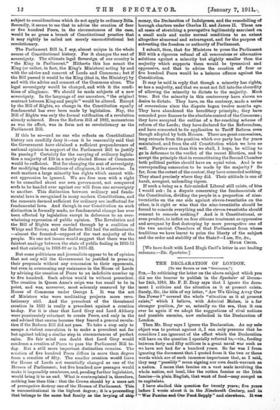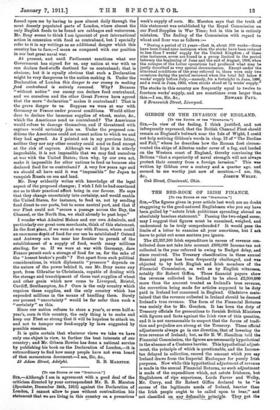T - Ful DECLARATION OF LONDON.
[To THE EDITOR, OF THE " SPECTATOR:. 1 SIR,—In criticising the letter on the above subject which you did me the honour to publish in the Spectator of Decem- ber 24th, 1910, Mr. F. E. Bray says that I ignore the docu- ment I criticise and the situation as it at present exists. Surely, Sir, the title of my letter, "Are We Giving Away Our Sea Power ?" covered the whole "situation as it at present exists," which I believe, with Admiral Mahan, is a far stronger position, for us, actually on the sea, than it can ever be again if we adopt the suggestions of rival nations and possible enemies, now embodied in the Declaration of London.
Then Mr. Bray says I ignore the Declaration. As my sole object was to protest against it, I can only presume that he considers I am ignorant of the effect which the Declaration will have on the question I specially referred to,—viz., feeding between forty and fifty millions in a. great naval war such as we have not had for a hundred years. So far was I from ignoring the document that I quoted from it the two or three words which are of each immense importance that, as I gala, they may " possibly " mean signing our own death-warrant as a nation. I mean that famine on a vast scale involving the whole nation, not local, like the cotton famine or the Irisk famine—in. plain English, that want of food—may compel us to capitulate.
I have studied this question for twenty years; five years before I wrote about it in the Nineteenth Century, and in " Was Famine. and Our Food Supply" and elsewhere.. It was
forced upon me by having to pass almost daily through the most densely populated parts of London, where almost the only English foods to be found are cabbages and watercress. Mr. Bray seems to think I am ignorant of past international action in connexion with food as contraband, but I specially refer to it in my writings as an additional danger which this country has to face,—I mean as compared with our position in ortr last great naval war.
At present, and until Parliament sanctions what our Government has signed for us, any nation at war with us can declare food-stuffs destined for us contraband; that is obvious; but it is equally obvious that such a Declaration might be very dangerous to the nation making it. Under the Declaration of London this danger to our enemy in making food contraband is entirely removed. Why? Because "without notice" our enemy can declare food contraband, and we ourselves and the other Great Powers have agreed that the mere " declaration " makes it contraband ! That is the grave danger to us. Suppose we were at war with Germany or France under present conditions. Would either dare to declare the immense supplies of wheat, maize, Ix., which the Americans send us contraband ? The Americans would refuse to damage themselves, and if threatened with capture would certainly join us. Under the proposed con- ditions the Americans could not resent action to which we and they had agreed. As I pointed out in my previous letter, neither they nor any other country could send us food except at the risk of capture. Although we all hope it is utterly improbable, it is not impossible that we may find ourselves at war with the United States ; then why, by our own act, make it impossible for other nations to feed us because she declared food for us contraband ? A very few years ago and we should all have said it was "impossible" for Japan to vanquish Russia on sea and land.
Mr. Bray evidently writes with knowledge of the legal aspect of the proposed changes ; I wish I felt he had convinced me as to their practical effect being in our favour. He says that they change uncertainty into certainty, and would enable the United States, for instance, to feed us, not by sending food direct to our ports, but to some neutral port, and that if our Fleet could not "secure a passage across the Bay, the Channel, or the North Sea, we shall already be past hope."
I wonder what Admiral Mahan and our own Admirals, and particularly our great corn merchants, think of this statement. In the first place, if we were at war with France, where could an enormous depot of food for our use be established ? Ostend and Antwerp are too near her frontier to permit of the establishment of a supply of food, worth many millions sterling, for us. If we were at war with Germany, dare France permit such a storage of food for us, for the sake of the "honest broker's profit" ? But apart from such political considerations, in which diplomatic " pressure " depends on the nature of the power behind it, can Mr. Bray name any port, from Gibraltar to Christiania, capable of dealing with the storage and transhipment of those vast supplies of wheat and other grain which now come to Liverpool, Bristol, Cardiff, Southampton, &c.? Ours is the only country which requires these supplies, and the only country which has expended millions in the means of handling them. Surely our present " uncertainty " would be far safer than such a "certainty" as this.
Since our nation refuses to store a year's, or even half-a- year's, corn in this country, the only thing is to make and keep our Fleet so strong that it will be hopeless to attack us, and not to hamper our food-supply by laws suggested by possible enemies.
It is quite certain that whatever views we take we have only one object in view, to further the best interests of our country ; and Mr. Gibson Bowles has done a national service by publishing his book on the Declaration of London,—it is extraordinary to find how many people have not even heard of that momentous document.—I am, Sir, &c.,



















































 Previous page
Previous page